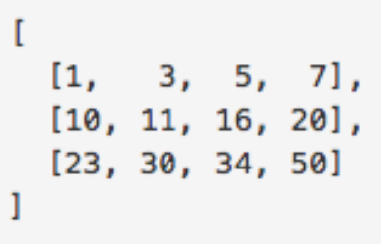一 给定两个字符串s和t,判断t是否为s的重新排列后组成的单词
- s = "anagram", t = "nagaram", return True
- s = "rat", t = "car", return False
- leetcode地址:https://leetcode.com/problems/valid-anagram/description/
解法一:排序,O(n*logn)
class Solution: def isAnagram(self, s, t): """ :type s: str :type t: str :rtype: bool """ ss = list(s) tt = list(t) ss.sort() tt.sort() return ss == tt """ 输入:"anagram"、"nagaram" 输出:true Runtime: 32 ms """
排序方法简写如下:
class Solution: def isAnagram(self, s, t): return sorted(list(s)) == sorted(list(t))
解法二:判断字母数量一致,时间复杂度O(n)
class Solution: def isAnagram(self, s, t): """ :type s: str :type t: str :rtype: bool """ dict1 = {} # 用字典来维护字符的数量 dict2 = {} for ch in s: dict1[ch] = dict1.get(ch, 0) + 1 # 没有就新建,有就加1 for ch in t: dict2[ch] = dict2.get(ch, 0) + 1 return dict1 == dict2 """ 输入:"anagram","nagaram" 输出:true Runtime: 32 ms """
二 给定一个m*n的二维列表, 查找一个数是否存在。列表有下列特性

列表有下列特性:
- 每一行的列表从左到右已经排序好。
- 每一行第一个数比上一行最后一个数大。
- leetcode地址:https://leetcode.com/problems/search-a-2d-matrix/description/
解法一:线性查找查找,O(mn)
class Solution: def searchMatrix(self, matrix, target): """ :type matrix: List[List[int]] :type target: int :rtype: bool """ for line in matrix: if target in line: return True return False
解法二:二分查找O(logn)
def serachMatrix(mtrix, target): h = len(mtrix) # 高 if h == 0: return False w = len(mtrix[0]) # 列 if w == 0: return False left = 0 right = w * h - 1 while left <= right: # 候选区有值 mid = (left + right) // 2 # 取中间值 i = mid // w j = mid % w if mtrix[i][j] > target: high = mid - 1 elif mtrix[i][j] < target: low = mid + 1 else: return True else: return False
3 给定一个列表和一个整数,设计算法找到两个数的下标,使得两个数之和为给定的整数
保证肯定仅有一个结果。
leetcode地址:https://leetcode.com/problems/two-sum-ii-input-array-is-sorted/description/
例如,列表[1,2,5,4]与目标整数3,1+2=3,结果为(0,1).
方法一:通过二分查找,找到需要的数字。时间复杂度:O(nlogn)
首先确定第一个数,再通过给定整数确定要查找的数,通过二分查找到需要的数。
class Solution: def binary_search(self, li, left, right,val): """ 二分查找 :param li: 输入的列表 :param val: 输入的待查找的值 :return: """ while left <= right: # 说明候选区有值 mid = (left + right) // 2 # 因为是下标, 因此要整除2 if li[mid] == val: # 找到待查找的值返回index return mid elif li[mid] > val: # 待查找的值在mid左侧 right = mid - 1 # 更新候选区 else: # li[mid] < val # 待查找的值在mid右侧 left = mid + 1 # 更新候选区 else: # 没有找到 return None def twoSum(self, nums, target): """ :type nums: List[int] :type target: int :rtype: List[int] """ for i in range(len(nums)): a = nums[i] b = target - a if b >= a: j = self.binary_search(nums, i+1, len(nums)-1, b) else: j = self.binary_search(nums, 0, i-1, b) if j: break return sorted([i+1,j+1])
方法二:针对已经排好序的列表
class Solution: def binary_search(self, li, left, right, val): """ 二分查找 :param li: 输入的列表 :param val: 输入的待查找的值 :return: """ while left <= right: # 说明候选区有值 mid = (left + right) // 2 # 因为是下标, 因此要整除2 if li[mid][0] == val: # 找到待查找的值返回index return mid elif li[mid][0] > val: # 待查找的值在mid左侧 right = mid - 1 # 更新候选区 else: # li[mid] < val # 待查找的值在mid右侧 left = mid + 1 # 更新候选区 else: # 没有找到 return None def twoSum(self, nums, target): new_nums = [[num, i] for i, num in enumerate(nums)] new_nums.sort(key=lambda x: x[0]) for i in range(len(new_nums)): a = new_nums[i][0] b = target - a if b >= a: j = self.binary_search(new_nums, i + 1, len(new_nums) - 1, b) else: j = self.binary_search(new_nums, 0, i - 1, b) if j: break return sorted([new_nums[i][1], new_nums[j][1]]) s22 = Solution() print(s22.twoSum([1, 2, 5, 4], 9))


